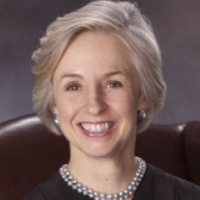Federal Judge Dashes High Hopes for Less Harsh Marijuana Reclassification
 Judge Kimberly Mueller
Judge Kimberly Mueller
Supporters of legal pot were ecstatic when U.S. District Judge Kimberly Mueller ordered a week-long hearing in Sacramento at the end of last year on the constitutionality of marijuana being officially classified among the scariest drugs on the planet, and then delayed releasing her opinion until April 15.
Surely, she wouldn’t take up the overburdened court’s valuable time if she was going to rule based on technical procedural arguments by prosecutors. This decision would be on the merits and the constitutional denial of equal protection under the law would reign supreme.
They were wrong. On Wednesday, Judge Mueller announced she was denying all motions by the defense to dismiss the case and would issue her written opinion soon. The former Sacramento city council member said that courts were not policymakers and that it was up to Congress to fix bad laws. As for this law, “This is not the court and this is not the time. . . . The questions raised by the defense are for Congress to resolve.”
The law is the Controlled Substances Act of 1970, which classified marijuana as a Schedule 1 drug, along with heroin, LSD, mescaline, ecstasy and the like, and was signed by President Richard Nixon as centerpiece to his war on crime and the counterculture. Schedule 1 is the most-restrictive of five classifications.
Attorneys for nine growers arrested on conspiracy marijuana charges in Northern California in 2011 argued that the law they were being prosecuted under was unconstitutional because marijuana is grouped with the harshest drugs which, by definition, have “no currently accepted medical use in treatment in the United States.”
That doesn’t seem like a good fit, especially since more than 20 states have passed medical marijuana laws. Neither do the other two criteria: “The drug or other substance has a high potential for abuse” and “There is a lack of accepted safety for use of the drug or other substance under medical supervision.”
Prosecutors argued (pdf) the law is the law and it was the judge’s job to use it. She did, after applying a “rational basis” analysis to it. This deferential default standard of review that courts apply to constitutional questions lets a law stand if there is any rational basis for linking it to a “legitimate” government interest.
Supporters were hoping for a breakthrough decision similar to one made by U.S. District Judge Vaughn Walker when he found California’s 2008 Proposition 8’s ban on gay marriage unconstitutional, setting off a legal chain reaction that ended when the U.S. Supreme Court let his decision stand in 2013.
While only Congress can amend the Controlled Substances Act, drugs can also be reclassified by the U.S. Attorney General after a scientific review. There is no indication that an attorney general picked by President Hillary Clinton, President Jeb Bush or any of the other prospective presidents would do that.
And bumping marijuana down to a Schedule 2 drug, like cocaine, meth, Oxycontin and opium, might not necessarily end the conflict between the federal government and the states over how to legally regard it. However, legislation introduced this year in Congress by Senators Cory Booker (D-New Jersey), Kirsten Gillibrand (D-New York) and Rand Paul (R-Kentucky) might help.
In addition to reclassifying marijuana down a notch, S.683 allows banks to handle money linked to marijuana sales and ramp up federal studies of the drug and its derivatives, which have been effectively banned to date.
But, realistically, what hope is there for legislation in which enlightened lawmakers spell marijuana “marihuana” throughout? At least they didn’t call it grass.
–Ken Broder
To Learn More:
Judge Won't Take Pot off Schedule 1 List (by Elizabeth Warmerdam, Courthouse News Service)
Today's Schweder Marijuana Ruling (by John Balazs, Eastern District of California Blog)
Ruling on Marijuana Classification Disappoints Advocates (by Don Thompson and Sudhin Thanawala, Associated Press)
U.S. Judge Won't Remove Marijuana from Most-Dangerous Drug List (by Maura Dolan, Los Angeles Times)
Schedule I Ruling Delayed Again—What Does It Mean? (by Jeremy Daw, The Leaf)
3-Day Hearing in Federal Court Challenges Putting Marijuana in the Same Drug Classification as Heroin (by Steve Straehley, AllGov)
- Top Stories
- Controversies
- Where is the Money Going?
- California and the Nation
- Appointments and Resignations
- Unusual News
- Latest News
- California Forbids U.S. Immigration Agents from Pretending to be Police
- California Lawmakers Urged to Strip “Self-Dealing” Tax Board of Its Duties
- Big Oil’s Grip on California
- Santa Cruz Police See Homeland Security Betrayal in Use of Gang Roundup as Cover for Immigration Raid
- Oil Companies Face Deadline to Stop Polluting California Groundwater





